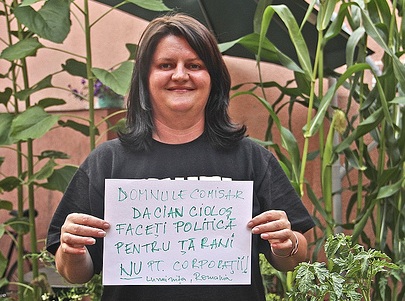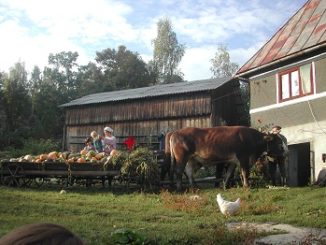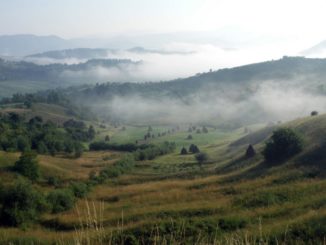In a recent interview for Ziare.com European Commissioner for Agriculture Dacian Cioloş affirms that he intends to return to Romania when his mandate ends, not necessary in politics, and certainly not in an executive position. You can find a full translation of the interview in which he explains his aspirations for the CAP reform in Romania below.

What is new in the Common Agricultural Policy (CAP) reform you initiated?
The new CAP will bring a more consistent financial support and a greater flexibility to the support instruments for farmers. In terms of Romania, this flexibility applies to both the way subsidies are given, and, more importantly, the way the money can be used in rural development programs. These elements could significantly contribute to the restructuring of agriculture and towards targeted support of high quality and diverse products; real solutions for the large diversity of Romanian farms.
Meaning higher subsidies and easier access?
Higher subsidies and easier access for the specific groups that need specific support. I am referring here to the small farms, young farmers and farms from disadvantaged areas. Through the reform I proposed, the Government can better achieve – depending on the strategy it develops – what it has envisioned for the future of the Romanian agriculture.
We wanted to escape from a situation where one could say that “We would like to do it, but the EU doesn’t let us,” or “We would have done things differently, but the EU regulations are too restrictive and don’t let us.” After the reform, the CAP will maintain the European spirit in its large objectives, but will permit the Member States to develop their own support, taking into consideration the local priorities and the specificity of agriculture in every region.
This means that the Government will have an important role. Would you consider that the Romanian agricultural policies have a correct strategy?
Romanian agricultural policies have suffered a lot from inconsistency. There have been a lot of changes to approaches and objectives, and no matter how good these different approaches may be, if there is no minimum level of continuity, you will not see results. One might be left with the impression that the policies were poorly elaborated, but there wasn’t even a chance to apply the certain intentions. Thus, there is a risk of discouraging those who have invested in agriculture. When you invest your money into a milk farm or an orchard, you invest in one year, and you start to get the first results after 2-3 years, and you’re cruising after 5 years. If in these 5 years, things have changed 3 times, it’s very difficult to consolidate your investment.
The same applies for the CAP which unfolds on a 7 year period. The CAP cannot be efficient in a Member State if that state doesn’t know its objectives or how to use the instruments of the CAP. In Romania, but also in other Member States, we have this reflex, that in the pre-adhering period, we wait to see what Brussels gives us, and then we check out what we can do on a local level.

If you were the new Agricultural Minister of Romania, what would your priorities be?
I would do the same thing I did on the EU level before I launched the CAP reform. I would start from a consistent dialog with the Romanian agricultural and rural environment, having an orientation about what I would want to do in the Government. This Government might have a certain political-ideological orientation and this is normal, because people have won the elections with a political discourse in which they have made some commitments, including the ones on agriculture.
It is obvious to put your approach on the first lines when you start the governance, but the pragmatic dialog with the agricultural medium is very important when you apply it. That is missing, and also, that is why I insist on the creation of some genuine agricultural chambers, I feel that we do not have to be politically afraid to organise such a sector. If we see the organising of a sector as a threat, we risk delaying the process of economic development, starting from the realities and needs. I find it very important to ensure that whatever is strategically decided by the Government is assimilated by the sector, because that is where finality occurs on any political idea.
Besides incoherence why does Romanian agriculture only responsible for a small percentage of the GDP?
It’s relative. In Romania, the agricultural and food sector has a higher influence on the GDP than in France, Germany or Italy. But this also depends on the ratio between agricultural development and global development. But it is clear that in Romania the agricultural sector has great potential, and I would highlight the agricultural efficiency, and the efficiency in the capitalisation of the agricultural products.
…the fact that many people are involved into agriculture is not a problem. The problem is that the people involved in agriculture, are not efficient, and a smaller scaled agriculture could be efficient and could handle more workforce, if there is better capitalization. More ambition and economic logic should be invested into this. Here I am thinking about the credit, fiscal and social policies in agriculture.
Do certain euro skeptic positions from the Romanian press and politics affect our position in Brussels?
Using euro skepticism without a proper information, or faulty knowledge of what EU is and can accomplish, is not specific to Romania. If you’ll observe the parliamentary elections from other Member States, you will see that the problem is more general. It happened in the Netherlands, Italy and also in France last year. It’s a problem which should concern not just one Member State or the other, but a problem of the European project as a whole. In Romania these discourses can occur because of insufficient information on what the EU means and also on some kind of a residual expectancy of the Romanians regarding the EU. As if the EU were a homogeneous block and only we are on the edge, stuck to it but not a part of it.
The most conclusive example is the European subsidy. People say that Romania has lower subsidies than the rest of the EU. But there are major differences between Portugal, which has a little more than 100 euro per hectare, and the Netherlands which has 400 euro per hectare. I believe that through a more active involvement in what the EU means, and taking responsibilities of the fact that we are a Member State, this populist and anti-European discourse could be diluted.
Your mandate will end next year. Are you tempted to enter in the Romanian politics? You have been invoked as a presidential of the right.
I do not find this idea tempting, because I believe that I can be efficient where I’m competent and have something to say and to do. I always have committed myself, in the past, when I was a Minister for Agriculture and in the present position of a European Commissioner, not necessarily to an objective of a political career, but to a more pragmatic one.
I have a mandate which lasts until November 2014. Until that time I have to finish the reform. Since I didn’t finish my main objective yet, I haven’t asked myself what I will do after. After I finish my job in Brussels, my intentions are to come back to Romania, but not necessary in politics. There are other fields in which I could also greatly express myself…




